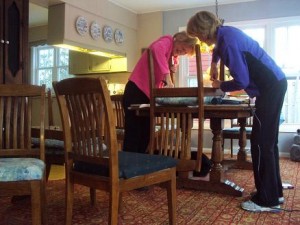This afternoon Mary and I talked about the ravages of time on our old faces and the magic of plastic surgery. Not that we’d do it, even though the mirror says we should. (It’s easier just to avoid the mirror.) But this afternoon we participated in a face lift of a different sort. The two of us put fresh upholstery on eight dining room chairs, a simple way to “lift” a room.
 To be successful required the right tools. Factory-tightened screws can be difficult to loosen, and succeeding assumes you’ve got the right screwdriver. You also need a staple gun, a tool that doubles as a weapon of mass destruction. Keeping a hammer handy is good for staples that don’t go all the way in, and a pliers is effective in yanking out the hopeless ones. A box of Band-Aids isn’t a bad idea, either.
To be successful required the right tools. Factory-tightened screws can be difficult to loosen, and succeeding assumes you’ve got the right screwdriver. You also need a staple gun, a tool that doubles as a weapon of mass destruction. Keeping a hammer handy is good for staples that don’t go all the way in, and a pliers is effective in yanking out the hopeless ones. A box of Band-Aids isn’t a bad idea, either.
 Doing something new is never easy, and trudging up the learning curve usually includes a measure of slip-backs: our chair corners ended up with too many folds; staples went in loosey-goosey and needed to be yanked out and redone; stray fabric peeked out from the chair frame, another re-do; one staple-shot grazed my finger and drew blood. But each chair we did got a bit easier and ended up looking nicer than the one before.
Doing something new is never easy, and trudging up the learning curve usually includes a measure of slip-backs: our chair corners ended up with too many folds; staples went in loosey-goosey and needed to be yanked out and redone; stray fabric peeked out from the chair frame, another re-do; one staple-shot grazed my finger and drew blood. But each chair we did got a bit easier and ended up looking nicer than the one before.
Isn’t that the way with life? When something new comes to us, particularly something we don’t want, we look for ways to step away from it. When we finally accept it, it’s usually not as bad as we anticipated. Practice may not make perfect, but working hard to learn something brings improvement.
God often asks us to do new things we don’t want to do, like love unlovable people, suffer intense pain, surrender a spouse or a child, care for someone who doesn’t appreciate it, or wait “forever” to see our prayers answered. But we can get better at handling each of God’s assignments by simply cooperating with his tutoring since he’s the great Supplier of know-how. As we tackle what he sends, little by little we work out the kinks.
 Of course God’s “chores” are far more complicated than fixing up old chairs, but Mary and I learned a few things as we went along. When we started out, our confusion, misuse of tools and lack of knowledge caused us to lose 45 minutes on the first chair. As we went along, there were set-backs and failures, but each cushion taught us better ways to do the same job. The last chair took only six minutes, start to finish. Gathered around the dining room table, our 22 year old chairs don’t show their age at all.
Of course God’s “chores” are far more complicated than fixing up old chairs, but Mary and I learned a few things as we went along. When we started out, our confusion, misuse of tools and lack of knowledge caused us to lose 45 minutes on the first chair. As we went along, there were set-backs and failures, but each cushion taught us better ways to do the same job. The last chair took only six minutes, start to finish. Gathered around the dining room table, our 22 year old chairs don’t show their age at all.
Now, if only Mary and I could use our improved stapling skills to give each other face lifts.
Jesus said, “Blessed are all who hear the word of God and put it into practice.” (Luke 11:28)






